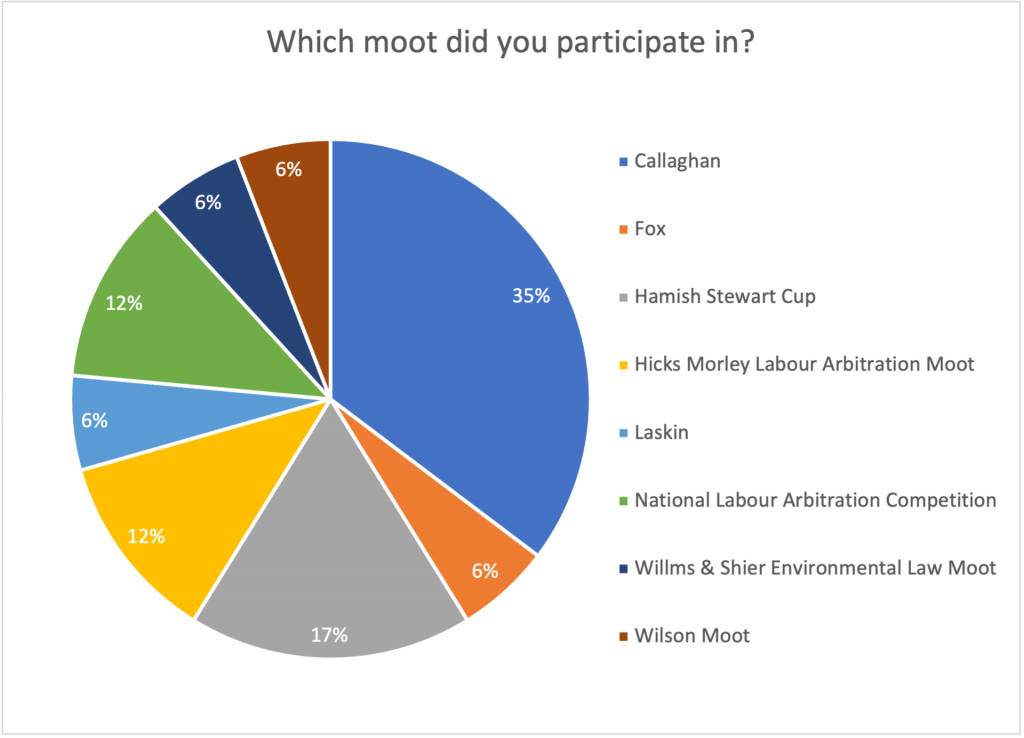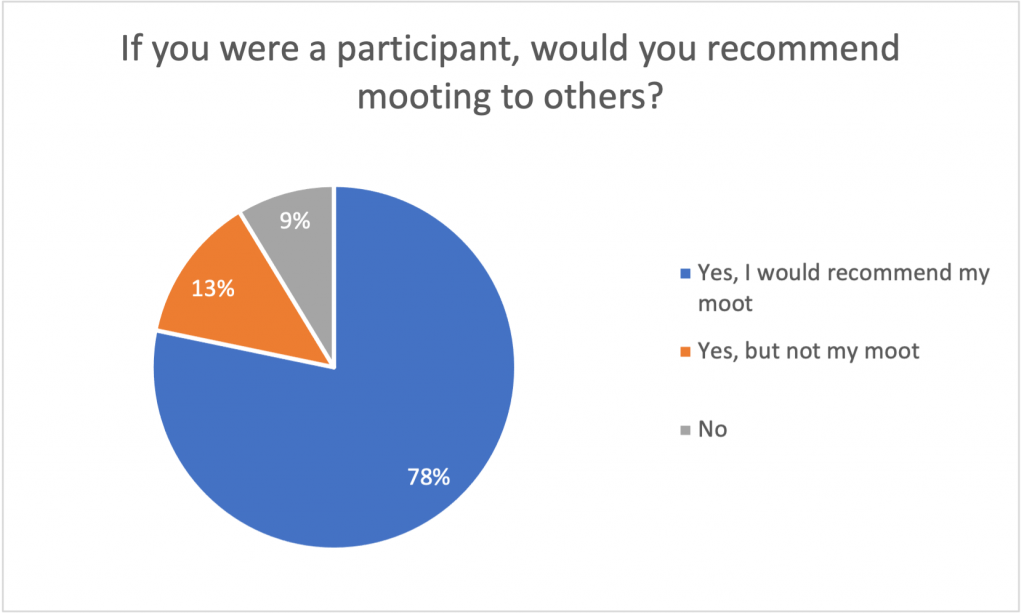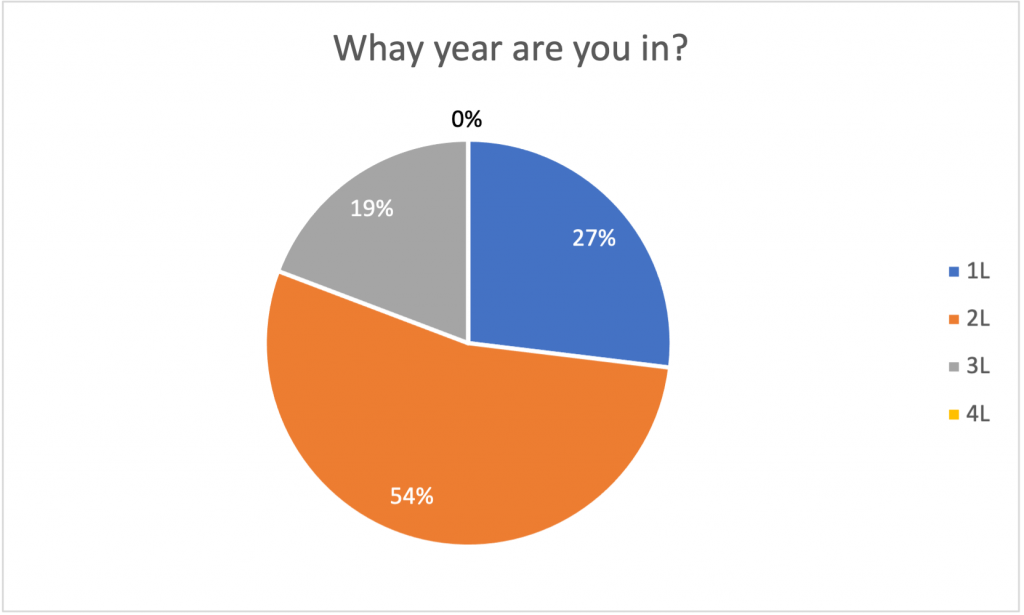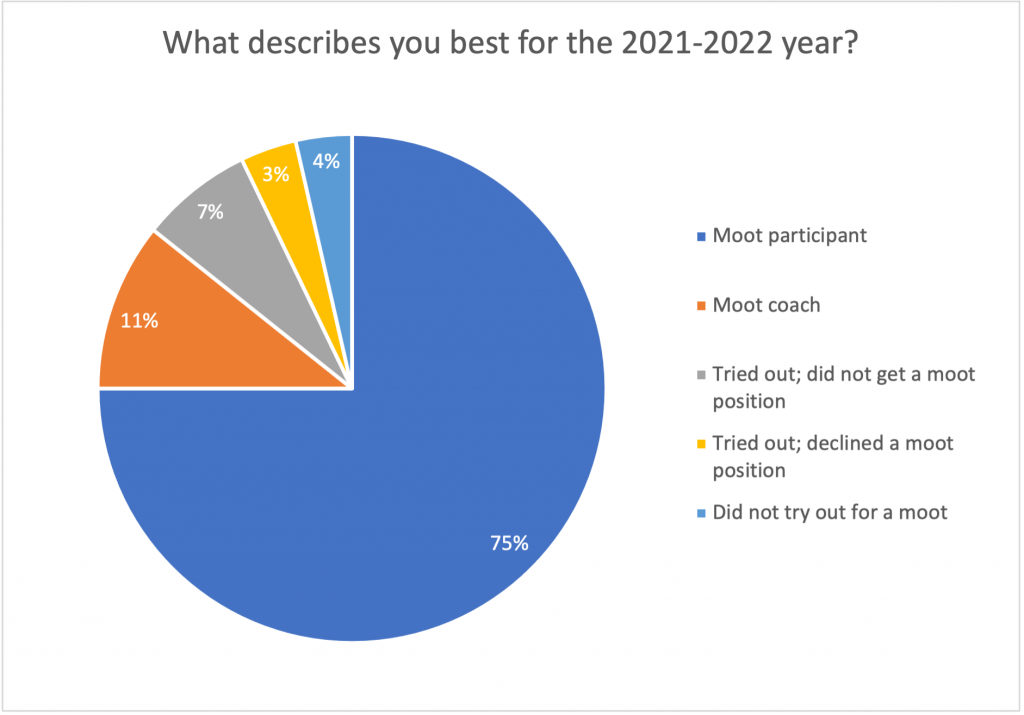Students speak out about their experience with this year’s competitive moots
As this year’s moots come to a close, we asked students to provide their feedback and comments on the mooting process. But first, a quick introduction on how moots work from the Moot Court Committee (MCC):
“The organization and administration of moots at the law school is split between the MCC and the Faculty. The Faculty sets all of the requirements and prerequisites for moots, registers competitors, and finds faculty advisors. The MCC, [a student-run body], is in charge of organizing and running mooting tryouts within the Faculty’s parameters, finding student coaches for those moots, coordinating the 1L moots and trial advocacy, and helping to organize the annual Grand Moot.”
Here’s what students had to say about their mooting experience:
What are your thoughts on the timing of moot tryouts?
For many, the timing wasn’t ideal:
- “They’re always at an inconvenient time and there’s not enough time given between when we get the materials and when the try-outs are.”
- “It happened right after my OCIs (non-Toronto) so not ideal at all. I asked MCC about this and they said “every year there will be something overlapping with tryouts.” I don’t see why the tryouts can’t occur earlier (i.e. May, or even in the summer) given that pre-req requirements are strictly enforced this year and people got bumped out of their preferred moots.”
- “The Baby Gale moots were the week of 1L job applications. Speaking for myself and for other students, the timing meant that that week was extremely stressful, and that I had less time than I would have liked to prepare for the tryouts themselves.”
- “The timing was a little rough, just because there’s so much going on during the first month of the term. With all of the time spent preparing for the moot, I fell behind on my classes, and it was a struggle to catch up.”
However, for others, the timing was good:
- “I think that the timing is appropriate given the practical restraints imposed by different moot timelines.”
- “Fine, I appreciated that tryouts were held at the beginning of the semester.”
- “Pretty good – right at the start of the year before things got busy.”
Some people gave their feedback on how timing could be better:
- “Having the tryouts a few weeks later in the term would be helpful (or allowing us earlier access to the materials so we can spread out our prep).”
- “Picking another week [that doesn’t coincide with 1L job applications], either well before or at least the week after the application date, would have been very helpful.”
- “It would have been nice if they weren’t right after the Upper Year Welcome events organized by SLS but understandable that it’s tough to coordinate.”
- “I think spring tryouts should be better than summer, because people will have job commitments during the summer and scheduling tryouts may be extremely difficult as a result.”
Which moot did you participate in?

How did you find the timing of the moot competition?
As with the timing of the tryouts, some did not think the competition days were ideally planned:
- “Interfered with clerkship applications.”
- “It was abysmal, truly and utterly horrid. Totally unreasonable. I had no partner and was expected to submit a factum outline December 14, a draft on Dec 21, and spend the entire break working. This is unacceptable. I had two papers (5k and 6k words each) and 2 90-100 percent exams. Why would you wait until literally December to start and then expect students to be slaves to their moot.”
- “Matthews (the firm hosting my moot) hoped to have an in-person moot and they pushed back the dates to Feb 10-12 this year. Normally it falls in January. I [found] those extra couple weeks extremely helpful given that for the majority of December I would be busy with finals and had no mental space for my moot …”
- “Why is [the Davies Securities Moot] during Law Ball?”
- “It fell on the Friday immediately after Reading Week, making the timing and workload following reading week difficult.”
- “Not a lot of information on timing, or length of time of the moot were provided during tryouts. We didn’t know exactly when the moot was until two weeks before.”
However, some people appreciated that their moots happened after or during the break(s):
- “It was during Reading Week which was helpful to do final preparations and not have to worry about lectures.”
- “I appreciated having the moot not take place over the winter break and solely during the first 2 months of the second semester, as I was able to balance things out well and not be too overwhelmed at any given time.”
While some students appreciated the timing, with many saying that it was “good” or great,” others have taken a somewhat negative view:
- “Rough but yolo there’s never a good time to torture yourself.”
Any comments on the moot tryouts process? What would you like changed?
Many suggested guidance for first time mooters:
- “Honestly, better instructions. I didn’t know any upper years with mooting experience and it was difficult to figure out how to prepare. I’ve talked to some people after the fact who did know upper years and they found the process much easier.”
- “Perhaps more guidance for first time mooters! Honestly, I think the school would benefit from a “moot club” that introduces newbies to mooting so that when tryouts come around, they’re ready.”
While some students gave positive comments about the overall structure of the process, others took issue with certain aspects of the process:
- “More time for submissions, fewer people trying out. Perhaps a preliminary video submission round to see who gets to try out.”
- “They give a ridiculous amount of preparatory materials for the tryouts and such little time to review them all that it doesn’t even seem worth it to try. Also, all the tryout materials are on constitutional/criminal law problems, so that already biases who does well at them and gets their preferred moot. I would’ve loved to try out for one of the more niche moots.”
- “The time between the reveal of the moot problem and the day of the first round of tryouts should be longer, so mooters have more time to prepare for their arguments. There should ideally be more training sessions for new mooters in order to level their playing field against experienced mooters and increase their odds of securing a moot.”
- “In my experience, the calling process is unnecessarily stressful and made the tryout process seem like a bigger deal than it is. I think an email should be sent to all participants simultaneously with a quick response time and subsequent emails to fill any spots that are declined.”
- “The 2 rounds with call times felt unnecessary and added to tension.”
Some comments on transparency:
- “Tryouts were great, however uncertainty re: course prerequisites and switching made the selection process/ post-tryout process confusing.”
- “My only feedback would be to give more feedback after tryouts.”
- “The whole evaluation process is a bit mysterious to me. How could they tell if a student would be a good mooter given that everyone has different styles?”
One specific complaint:
- “For the Baby Gale, I think that more people should be cut after the first tryout. As is, it seems like only 10-20 people out of 80 applicants get cut. Having such a large number of people go through to round 2 means that the people who do get cut after round 1 feel singled out and especially bad about their performance, it means that judges have less time to focus on people who have a serious shot of making the event, and it means that people who realistically have no chance of being selected given their round 1 performance are forced to go through another tryout that they otherwise would not have to. There may be good reasons for doing it the way it is, but from my perspective it seems bad for everyone: the people who get cut, the people who go through, and for the people judging the competition.”
If you were a participant, how helpful were your mooting coaches?
Almost all the feedback was positive:
- “VERY HELPFUL— both students and practitioners. My student coaches spent tons of their free time playing the arbitrator role and answering our questions. Practitioner coaches sat with us for three hours in the evening every week (sometimes twice a week), gave very helpful advice in terms of style and law, and got some arbitrators to roast us (okay, not really roasting because they’re all nice, but it was intense).”
- “Extremely helpful. I knew very little about criminal procedure and my coaches covered my blind spots and were very helpful in guiding my research and telling me what works and what doesn’t.”
- “My coach has been very helpful so far, and has done a great job pushing all participants to practice more both together and individually than I think we would have done otherwise, which is good.”
- “I was added as a replacement last minute, so I didn’t get the chance to work with the coaches too much, but when I did, they were very kind and helpful and provided lots of constructive criticism.”
Others were positive, but with some complications:
- “My student coaches were amazing, very helpful and kind. I did not appreciate our faculty coaches, however.”
- “Our mooting coaches were very insightful and supportive. Two of the three coaches were busy with other moots so I’m not too sure how much substantive assistance there was from them.”
- “My moot coach is incredible (and quite frankly brilliant), however, I could have benefitted from a more structured schedule (e.g., planning out run-throughs in advance for each week).”
- “Wonderful and very helpful re: style, coaching, etc., however not having coaches versed in the subject matter was a barrier.”
If you were a participant, how did you find the workload for your moot?
The moots generally kept mooters quite busy:
- “My workload was a bit more because I was added so close to the moot and didn’t have a lot of time, but it was still definitely manageable and the coaches worked with our schedules for practice runs.”
- “The workload was extremely high, considering it only leads to a speculative benefit; but I was always willing to put in the work and I am relieved to be free from it now.”
- “A lot but truly rewarding. The moot (preparation process) has been the highlight of my law school journey so far.”
But many reflected that such workload was expected and reasonable:
- “Heavy workload. Lots of research, lots of writing, and lots of run-throughs. But I think it is reasonable, given the fact that mooting is roughly equivalent to a course.”
- “The workload was doable – busy but not dejecting.”
- “Neither the Hicks Morley nor the Baby Gale require us to write factums, so they have been fairly light. The Hicks Morley took probably 5-6 hours to prep for, plus the actual event itself, while the Baby Gale has been more involved but so far very manageable.”
- “I thought it was the perfect balance. It wasn’t too much or too little. Some weeks were definitely harder than what I would’ve preferred, but other weeks were lighter which made up for it.”
Some comments regarding timing of the workload:
- “Almost the entire workload was crammed into January and February — I was so busy with moot prep that I didn’t catch up on my readings until the end of the Reading Week. We receive 1 credit in fall term and 2 credits in winter term for the moot, but I did the full 3 credits of work in the winter term.”
- “It was a lot of work in the first week, but was more manageable after that”
If you were a coach, how did you feel about the time commitment that it involved?
Coaches reflected similar time commitments as the mooters:
- “I think the time commitment was considerable but very rewarding and ultimately up to my discretion (the faculty mentors allowed me to be as involved or uninvolved as I needed to be). Coaching took up between 5-10 hours every week starting in January and ending mid-February.”
- “Fairly intense, given the time needed to organize external run throughs, prepare for run-throughs with the mooters, answer mooters’ questions, attend both internal and external run throughs, etc. I was surprised that coaches typically receive just one credit.”
- “Bruh.”
If you were a participant, would you recommend mooting to others?

Final thoughts…
Mooters offered many pieces of concrete feedback to improve the mooting experience:
- [Referring to the try-out process]: “It might be better to give mooters a simple non-legal question (eg. Should the law school make Evidence a mandatory upper year course?) instead of a factum and expect them to prepare cohesive arguments in a short amount of time. Not everyone may be the best at an area like constitutional law. This levels the playing field even further.”
- “Mooters should be required to provide a brief statement on why they want to sign up for a particular moot. Mooters should be doing a moot because they are passionate about that subject matter, not because they merely want to moot and would be willing to accept anything. I don’t know if coaches get to participate in the mooter selection process, but if they aren’t, they should be allowed to give their input on who to choose.”
- “I noticed that the mooting program depends heavily on volunteers (not only the coaches, but also the MCC members, timekeepers and clerks for some moots, etc.). I’d love to see more support from the faculty, e.g., one or more employees or non-student volunteers whose work is solely dedicated to supervising and supporting the mooting program (as is the case in many other law schools, from what I understand), greater involvement on the part of external, non-student coaches, and more consistency across the various moots in terms of the support we receive.”
- “If there are corequisite courses for the moot, the administration should require students to take them in the fall semester, not the winter semester, so that mooters would be familiar with the background knowledge required for the moot as they write their facta and start with their run throughs.”
- “More transparency around judging and scores would be appreciated.”
- “As someone who did not moot before coming to law school, I appreciated student-driven mooting programs for 1Ls, like 1L trial advocacy. I’d love to see more faculty support for mooting options in 1L, especially non-competitive learning experiences. I entered law school with an interest in litigation and wanted to improve my public speaking skills, but I found that 1L mooting opportunities are unfortunately fairly limited.”
There were a few more bad experiences:
- “For 1L, make sure judges are constructive and supportive—I had one round with a really supportive judge and it was great for my first time. My second round had a judge that was too harsh/seemed mean and not constructive so I left feeling bad about myself.”
- “SF changed all the deadlines when I dropped. Extremely unhelpful and basically told me that she understands why I was dropping out (that it would be challenging for an inexperienced advocate like myself). We are all inexperienced advocates?? Aren’t we here to gain experience?”
- “Sara Faherty needs to make more internal moots or accept more prestigious moots so more people get an opportunity to do it.”
- “I believe the moot competitions themselves are inadequate, arbitrary, and poorly judged. This is because of the lack of standardization across the competition and the randomness of judging across rounds.”
And comments about specific moots:
- “[Judges] were not exactly transparent with their scoring process. Since teams appear before 9 different preliminary judges (approx 60 judges total for prelims), the probability of score inflation was high. It was also evident through the results that the teams who advanced into the following rounds, were scored by the same few number of judges.”
- “NLAC may not be very popular but it is a great moot—it has no pre-req (strange, but I didn’t take any labour law courses and I could still make it) and no factum!!”
- “The Hamish Stewart Cup seemed a bit fleeting. I think I would have preferred a competitive moot.”
Some closing statements:
- “It was very hectic and stressful, but worth it for the experience! It was definitely a tradeoff in the sense that I had less time for studying, socializing, and participating in other extra-curriculars.”
- “Moot club!!! We need one!!! Make mooting more accessible to newbies!!!”
- “Glad we got to do it in person.”
Overall, there were mixed reviews on this year’s moots. We figured we would give the last word to the people who plan it, the MCC:
“It has been a great year for mooting at U of T Law. Especially in a difficult hybrid year, we would like to thank all of the fantastic mooters and all of the dedicated coaches who have volunteered their time to make the mooting program here what it is. Your time and efforts are extremely appreciated!”
Breakdown of respondent demographics:







